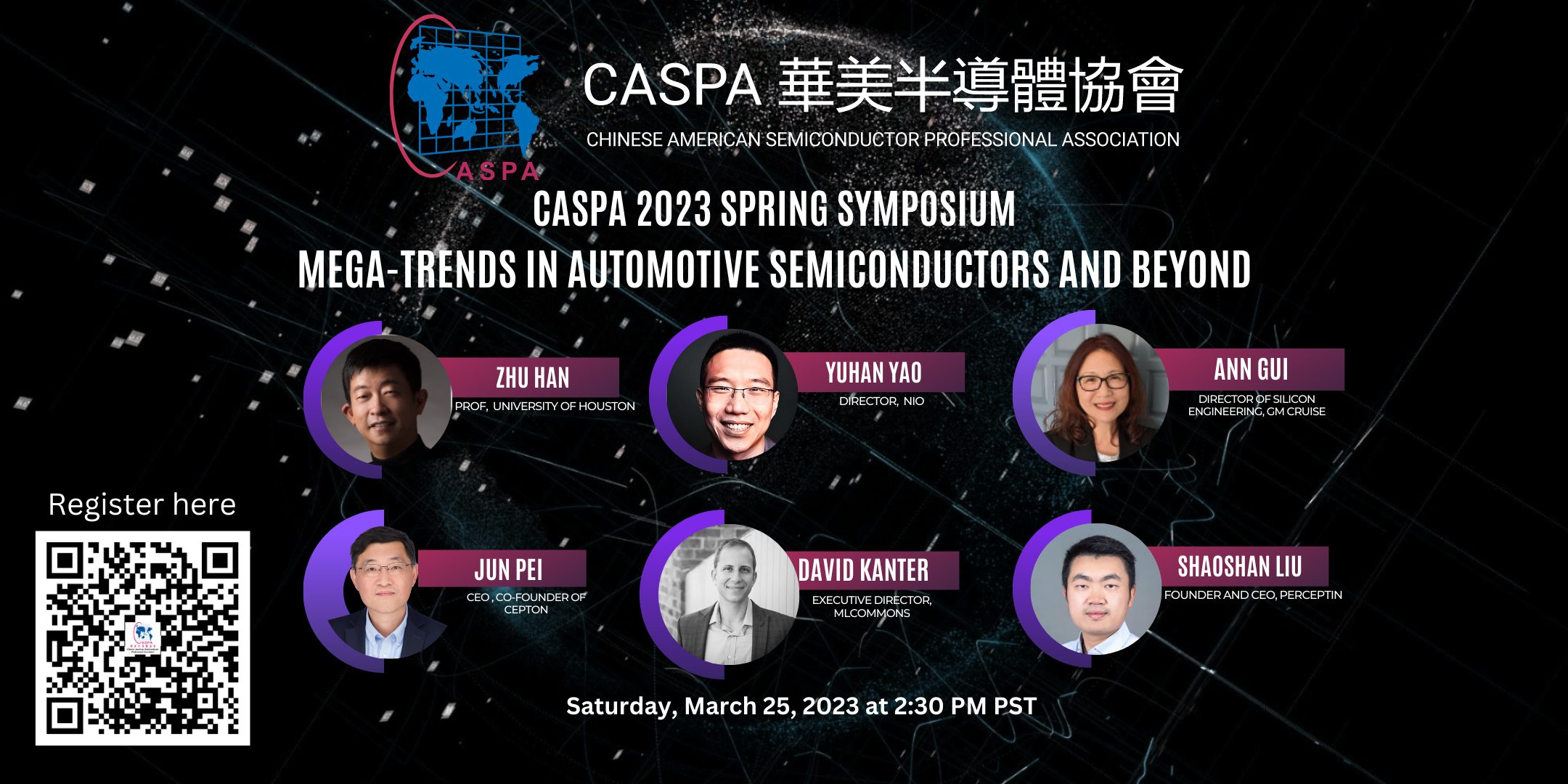CASPA 2023 Spring Symposium: Mega-Trends in Automotive Semiconductors (3/25/2023)

Join Zoom Meeting
https://us06web.zoom.us/j/84731161269?pwd=em15aE11RVhhUGk3c242Y0ZwaHVwQT09
Meeting ID: 847 3116 1269
Passcode: 642891
As we observed over the past couple of years, the booming of deep learning coupled with the ever-increasing computational power opens up the possibility of better driving experience: more intelligent cockpit, V2X communication, better ADAS, promising autonomous driving, etc. This prospect has driven mass investment in larger automotive corporations as well as attracted significant venture capital into startups. Semiconductor chips, which is the main component in the computing platform, is the key enabler for everything aforementioned. A report from McKinsey estimates that overall revenues for automotive chips could rise from $41 billion in 2019 to $147 billion by 2030.
In response to these opportunities, CASPA, as the world’s largest Chinese American semiconductor professional association, will organize this year’s Spring Symposium with the theme of “Mega-Trends in Automotive Semiconductors and Beyond”. We’ve invited a couple of experts from industry and academia to share their perspectives on this topic. In addition to the speeches, a panel session will also be held to share more visions from the panelists.
Spring Symposium is a signature event from CASPA and well attended by the technical professionals and executives from Bay Area and worldwide.
Below is the agenda:
|
03/25/2023 |
2023 CASPA Spring Symposium Mega Trends in Automotive Semiconductor and Beyond |
| 2:30 – 2:40 pm | Welcome Remarks and Introduction of CASPA |
| 2:40 – 3:10 pm | Zhu Han, Professor, University of Houston |
| 3:10 – 3:40 pm | David Kanter, Founder & Executive Director, MLCommons |
| 3:40- 4:10 pm | Jun Pei, Co-Founder & CEO, Cepton |
| 4:10 – 4:40 pm | Yuhan Yao, Director, NIO |
| 4:40 – 5:10 pm | Shaoshan Liu, Chair of IEEE Entrepreneurship China |
| 5:10 – 5:15 pm | 5-min Break |
| 5:15 – 6:15 pm | Panel Discussion
Moderator: Panelist: |
| 6:15 – 6:30 pm | Closing Remarks and Prize Draw |
Zhu Han,
ECE Department and CS Department, University of Houston
Bio: Zhu Han received the B.S. degree in electronic engineering from Tsinghua University, in 1997, and the M.S. and Ph.D. degrees in electrical engineering from the University of Maryland, College Park, in 1999 and 2003, respectively. From 2000 to 2002, he was an R&D Engineer of JDSU, Germantown, Maryland. From 2003 to 2006, he was a Research Associate at the University of Maryland. From 2006 to 2008, he was an assistant professor in Boise State University, Idaho. Currently, he is a John and Rebecca Moores Professor in Electrical and Computer Engineering Department as well as Computer Science Department at University of Houston, Texas. His research interests include security, wireless resource allocation and management, wireless communication and networking, game theory, and wireless multimedia. Dr. Han is an NSF CAREER award recipient of 2010. Dr. Han has several IEEE conference best paper awards, and winner of 2011 IEEE Fred W. Ellersick Prize, 2015 EURASIP Best Paper Award for the Journal on Advances in Signal Processing and 2016 IEEE Leonard G. Abraham Prize in the field of Communication Systems (Best Paper Award for IEEE Journal on Selected Areas on Communications). Dr. Han is the winner 2021 IEEE Kiyo Tomiyasu Award. He has been an IEEE fellow since 2014, AAAS fellow since 2020, IEEE Distinguished Lecturer from 2015 to 2018 and ACM Distinguished Speaker from 2022-2025. Dr. Han is a 1% highly cited researcher according to Web of Science since 2017.
Dr. Shaoshan Liu
Dr. Shaoshan Liu is a technology entrepreneur in the intelligent electric vehicle (IEV) industry. His background is a unique combination of technology, entrepreneurship, and public policy. On technology, Dr. Shaoshan Liu has published 4 textbooks, more than 100 research papers, and holds more than 150 patents in autonomous machines. On entrepreneurship, Dr. Liu has commercially deployed autonomous driving services in the U.S., Europe, Japan, and China etc. He is also the Asia Chair of IEEE Entrepreneurship. On public policy, Dr. Liu is an agenda contributor of the World Economic Forum and has served on the World Economic Forum’s panel on Industry Response to Government Procurement Policy. Dr. Liu is leading the Autonomous Machine Computing roadmap under IEEE International Roadmap of Devices and Systems (IRDS) and is a member of the ACM U.S. Technology Policy Committee. Dr. Liu’s educational background includes a Ph.D. in Computer Engineering from U.C. Irvine, and a Master of Public Administration (MPA) from Harvard Kennedy School. He is an IEEE Senior Member, an IEEE Computer Society Distinguished Speaker, an ACM Distinguished Speaker.
Ann Gui,
Director of silicon engineering, GM Cruise
Ann has been in the semiconductor industry for more than 25 years. Currently she leads the silicon engineering team at Cruise, building custom chips for Cruise’s next generation autonomous vehicle. Prior to that, she has led the development of many successful networking silicon products at Cortina System and Dell Technology. She holds a master’s degree from New Jersey Institute of Technology and bachelor’s degree from Fudan university.
Dr. Yuhan Yao
Director, Head of Autonomous Driving Sensors and Hardware Architecture Team, NIO
Bio:
Dr. Yuhan Yao received a bachelor’s degree in Electrical Engineering and Computer Science from Peking University in China, and a doctorate degree in Electrical Engineering from the University of Southern California in the United States. In the NIO Autonomous Driving (AD) Department, Dr. Yao is currently leading the autonomous driving sensors and hardware architecture team and the next-gen solution delivery team.
Before joining NIO, Dr. Yao had studied and worked in the United States since 2012. In the past decade, Dr. Yao has served key roles as tech lead and system architect for Oracle, Apple and Waymo. Dr. Yao has led efforts to deliver several industry-renowned products such as iPhone, Waymo Driver, and NIO Autonomous Driving systems.
David Kanter
Executive Director, MLCommons
Bio:
David Kanter is a Founder and the Executive Director of MLCommons® where he helps lead the MLPerf™ benchmarks and other initiatives. He has 16+ years of experience in semiconductors, computing, and machine learning. He founded a microprocessor and compiler startup, was an early employee at Aster Data Systems, and has consulted for industry leaders such as Intel, Nvidia, KLA, Applied Materials, Qualcomm, Microsoft and many others. David holds a Bachelor of Science degree with honors in Mathematics with a specialization in Computer Science, and a Bachelor of Arts with honors in Economics from the University of Chicago.
Dr. Jun Pei,
Dr. Jun Pei, CEO and co-founder of Cepton (Nasdaq CPTN), is a serial entrepreneur and technologist in optics and electronics. An innovator by nature, inspired by his grandfather Pei Wenzhong who was a renowned anthropologist, Pei has been referred to by some industry veterans as a “genius at instrumentation.” He developed the first optical and acoustical combination technique in semiconductor thin film measurement and holds numerous patents in the field of metrology and lidar. Before co-founding Cepton, Pei founded AEP Technology, an advanced optical instrumentation company, that focused on 3D surface profiling on a nanometer scale and pioneered the application of parallel computing in interferometric microscopy. AEP Technology’s instruments are used in advanced research institutions across the world.
Earlier in his career, he worked as a senior scientist at KLA-Tencor in the field of defect inspection in a nanometer scale, enhancing leading-edge semiconductor processing. He also led an engineering team at Velodyne in helping launch the HDL-64 lidar which is used in autonomous vehicles even today. Pei received his Ph.D. and Master’s in electrical engineering from Stanford University. While a student at Stanford, Pei studied optics, acoustics and electronics with an initial interest in becoming a professor before, as he says it, “being corrupted by the capitalism surrounding him in Silicon Valley,” shifted his interests. Pei received his Bachelor’s degree in physics and computer science as a Wien International Scholar at Brandeis University, and studied physics at Peking University.
Free tickets:
